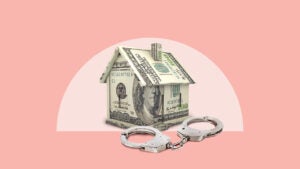How homeowners can avoid post-disaster mortgage scams

Whenever disaster strikes a region — like the wildfires that have devastated the Hawaiian island of Maui — homeowners can experience not only immediate emotional stress but a future financial squeeze. The one-two punch can include a loss of income and an increase in expenses.
“Unfortunately, scammers rely on this vulnerability and attempt to exploit homeowners in disaster-stricken areas,” as the U.S. Department of Housing and Urban Development (HUD) says in a fraud bulletin issued Aug. 10. After scaring hard-hit individuals with the specter of delinquent mortgage payments and foreclosed homes, they offer solutions — “mortgage relief,” “loan modifications” — which of course end up costing you for real. Not just money, but even the home itself.
Bad actors prey on your fears, but homeowners should know that lenders offer generous mortgage forbearance options – and that means if you’ve been hurt by an extreme weather event, you face almost no risk of losing your home to foreclosure.
Typical mortgage-relief scams
Always be wary if an unknown party contacts you out of the blue, offering financial help — the onus is on the homeowner to request mortgage aid (see “How to ask for help” below). In particular, HUD’s fraud bulletin says homeowners should be on the lookout for these common moves from the scammers’ playbook:
- Charging upfront fees. If someone asks you to pay upfront for help in avoiding foreclosure or modifying your mortgage loan, beware. It is illegal for anyone other than a licensed attorney to charge a homeowner a prepaid fee to negotiate a mortgage modification on the homeowner’s behalf, HUD says.
- Cutting out your mortgage company. Scammers are notorious for telling you to make mortgage payments directly to them, instead of to your mortgage company — and to not contact your mortgage company at all.
- Requesting deed transfers. If someone asks you to transfer the deed or title to your home, that’s a tell. Mortgage relief rarely involves you surrendering ownership of your residence.
- Pressuring you to act immediately. This is a classic hallmark of fraud – creating a sense of now-or-never urgency and strong-arming you to quickly sign documents. The reality is that the foreclosure process takes months to unfold, so while you should communicate promptly with your lender, you shouldn’t let anyone pressure you into a mortgage relief program. And never commit in writing to anything you don’t fully understand.
Mortgage relief programs for homeowners hit by natural disasters
Mortgage lenders have a longstanding practice of working with borrowers to avoid foreclosure after extreme weather events. All of the major players who insure, guarantee or otherwise back residential loans – Fannie Mae, Freddie Mac, HUD’s Federal Housing Administration (FHA) and the U.S. Department of Veterans Affairs (VA) – direct lenders to extend mortgage forbearance to homeowners affected by earthquakes, floods, tornadoes and other natural disasters.
If your lender agrees to forbearance, you can pause your monthly payments with no penalties. To receive this benefit, contact your mortgage servicer directly. That company is under orders to abide by forbearance rules issued by Fannie and Freddie if it’s a conventional loan (which make up about two-thirds of the U.S. mortgage market), or by the FHA or VA if you borrowed through one of those government mortgage programs.
The details of your forbearance can vary based on the type of loan and your financial circumstances. Pandemic forbearance programs gave borrowers a break for six months, but homeowners could extend the payment pause for an additional six months. After forbearance ends, you need to resume payments. If you’re still facing financial hardship, you can work with your lender to negotiate a loan modification, a process designed to adjust monthly payments to fit your new financial reality.
How to ask for mortgage relief
While disaster assistance is readily available, you, the mortgage borrower, do need to take action. Your lender or mortgage servicer (the company that collects your payments) won’t automatically enroll you in forbearance. You must contact them to start the process.
You might also want to understand your rights via info from the entities behind your mortgage. Here’s a guide to contacting the four major players responsible for the vast majority of U.S. home mortgages:
- Fannie Mae: Use the company’s lookup tool to see if Fannie owns your conventional loan. You can also call 1-800-232-6643 or go to www.KnowYourOptions.com/relief.
- Freddie Mac: Check to see if Freddie owns your conventional loan with that company’s search tool. For help, you can phone 1-800-373-3343 or visit http://myhome.freddiemac.com/own/getting-help-disaster.html.
- Federal Housing Administration (FHA): For information about your FHA loan, contact the Department of Housing and Urban Development’s National Servicing Center at 877-622-8525. For other questions, contact the FHA Resource Center at 800-CALL-FHA. For a list of HUD-approved housing counselors, go to: www.hud.gov or call 800-569-4287.
- Department of Veterans Affairs (VA). Veterans or active-service members with VA loans can call 877-827-3702. Veterans whose homes have ever been modified with VA Specially Adapted Housing grant funds should also contact the VA at 877-827-3702. Depending on the situation, additional grant funds may be available to fix a disaster-damaged home.
Why we ask for feedback Your feedback helps us improve our content and services. It takes less than a minute to complete.
Your responses are anonymous and will only be used for improving our website.
You may also like

Best FHA mortgage lenders in 2025





